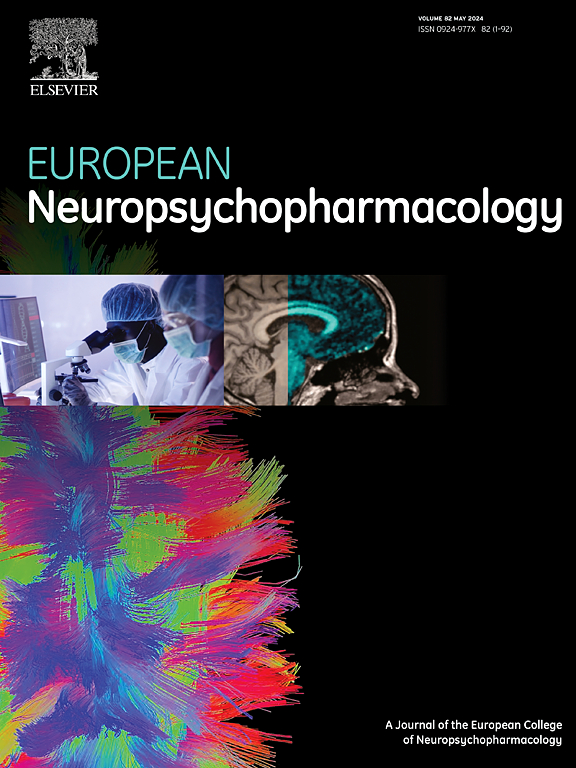A specific GPR56/ADGRG1 splicing isoform is associated with antidepressant response in major depressive disorder
IF 6.1
2区 医学
Q1 CLINICAL NEUROLOGY
引用次数: 0
Abstract
Major Depressive Episode (MDE) is one of the most common psychiatric disorders. Often difficult to treat, this disease is one of the leading causes of suicide. A recent study showed an association between GPR56/ADGRG1 mRNA, MDE and response to antidepressant treatment in blood and in brain. Among GPR56 splicing variant, the S4 isoform has recently been associated with microglial synaptic pruning, while microglia are already known as a central player in MDE. Therefore, we hypothesized that S4 is the specific isoform associated to MDE and antidepressant response. To test our hypothesis, an in silico analysis was first performed to identify the different proteins and transcript isoforms of GPR56. This analysis allowed to design PCR and qPCR primers. GPR56 total, S4 and S3 were assessed by RT-qPCR in leukocytes from a cohort of 46 MDE patients including non-responders (NR, n = 31) and responders-remitters (R, n = 17) to antidepressant treatment. We replicated the result of one of our previous studies, which described an increase in total GPR56 mRNA in Rs. Additionally, we observed that this variation differs among mRNA splicing variants, with S4 exhibiting a similar pattern of variation while S3 shows no significant change. The differences observed withstood statistical correction for covariates of interest such as smoking, gender and suicidal ideation, demonstrating the robustness of the model. These findings confirm our hypothesis that certain mRNA splicing variants of GPR56 may play a more significant role in depression. This study highlighted a link between the GPR56-S4 and response to antidepressant treatment.
一种特殊的GPR56/ADGRG1剪接异构体与重度抑郁症的抗抑郁反应有关。
重度抑郁发作(MDE)是最常见的精神疾病之一。这种疾病通常难以治疗,是自杀的主要原因之一。最近的一项研究表明,GPR56/ADGRG1 mRNA、MDE与血液和大脑中抗抑郁药物治疗反应之间存在关联。在GPR56剪接变体中,S4亚型最近与小胶质细胞突触修剪有关,而小胶质细胞已经被认为是MDE的核心参与者。因此,我们假设S4是与MDE和抗抑郁反应相关的特异性亚型。为了验证我们的假设,首先进行了计算机分析,以鉴定GPR56的不同蛋白质和转录异构体。该分析允许设计PCR和qPCR引物。采用RT-qPCR方法评估46例MDE患者的白细胞GPR56 total、S4和S3,包括抗抑郁治疗无反应(NR, n = 31)和有反应-缓解(R, n = 17)。我们重复了我们之前的一项研究结果,该研究描述了Rs中GPR56 mRNA总量的增加。此外,我们观察到这种变化在mRNA剪接变体之间是不同的,S4表现出类似的变化模式,而S3没有明显变化。观察到的差异经受住了相关协变量(如吸烟、性别和自杀意念)的统计校正,证明了模型的稳健性。这些发现证实了我们的假设,即GPR56的某些mRNA剪接变体可能在抑郁症中发挥更重要的作用。这项研究强调了GPR56-S4与抗抑郁治疗反应之间的联系。
本文章由计算机程序翻译,如有差异,请以英文原文为准。
求助全文
约1分钟内获得全文
求助全文
来源期刊

European Neuropsychopharmacology
医学-精神病学
CiteScore
10.30
自引率
5.40%
发文量
730
审稿时长
41 days
期刊介绍:
European Neuropsychopharmacology is the official publication of the European College of Neuropsychopharmacology (ECNP). In accordance with the mission of the College, the journal focuses on clinical and basic science contributions that advance our understanding of brain function and human behaviour and enable translation into improved treatments and enhanced public health impact in psychiatry. Recent years have been characterized by exciting advances in basic knowledge and available experimental techniques in neuroscience and genomics. However, clinical translation of these findings has not been as rapid. The journal aims to narrow this gap by promoting findings that are expected to have a major impact on both our understanding of the biological bases of mental disorders and the development and improvement of treatments, ideally paving the way for prevention and recovery.
 求助内容:
求助内容: 应助结果提醒方式:
应助结果提醒方式:


